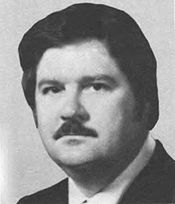Richard Alvin Tonry
| Richard Alvin Tonry | |
|---|---|
 |
|
| United States Representative for Louisiana's 1st congressional district | |
|
In office January 3, 1977 – May 4, 1977 |
|
| Preceded by | Felix Edward Hebert |
| Succeeded by | Bob Livingston |
| Louisiana State Representative for District 103 (Orleans and St. Bernard parishes) | |
|
In office January 1976 – December 1976 |
|
| Preceded by | Elmer R. Tapper |
| Succeeded by | Edward S. Bopp |
| Personal details | |
| Born |
June 25, 1935 New Orleans, Louisiana, USA |
| Died | July 3, 2012 (aged 77) Lumberton, Mississippi |
| Resting place | St. Bernard Memorial Gardens in Chalmette, Louisiana |
| Political party | Democratic |
| Alma mater | Loyola University New Orleans College of Law |
| Occupation | Lawyer |
Richard Alvin "Rick" Tonry (June 25, 1935 – July 3, 2012) was a Louisiana politician affiliated with the Democratic Party.
He graduated in 1962 from Spring Hill College in Mobile, Alabama. In 1967, he earned a law degree from Loyola University New Orleans College of Law. He practiced law in the New Orleans area for almost a decade before being elected to the Louisiana House of Representatives in the first-ever nonpartisan blanket primary held at the state level in the fall of 1975.
He served a year (1976) in Louisiana House District 103 and eight months (1977) from Louisiana's 1st congressional district. Shortly after taking his state House seat, Tonry declared his candidacy for the United States Congress after the 36-year Democratic incumbent, Felix Edward Hébert, announced his retirement. He narrowly defeated Republican Bob Livingston, an assistant state attorney general, in one of the last congressional elections held before Louisiana adopted its nonpartisan blanket primary.
Tonry, investigated by the U.S. Attorney Gerald J. Gallinghouse, was accused of allowing subordinates to steal votes by stuffing ballot boxes in St. Bernard Parish, a suburb of New Orleans. He was charged with receiving illegal campaign funds beyond the $1,000 federal limit then imposed per contribution. These allegation ultimately led to his resignation, his guilty pleas of campaign finance irregularities, and a six-months prison sentence at the Federal Prison Camp in Montgomery, Alabama.
...
Wikipedia
